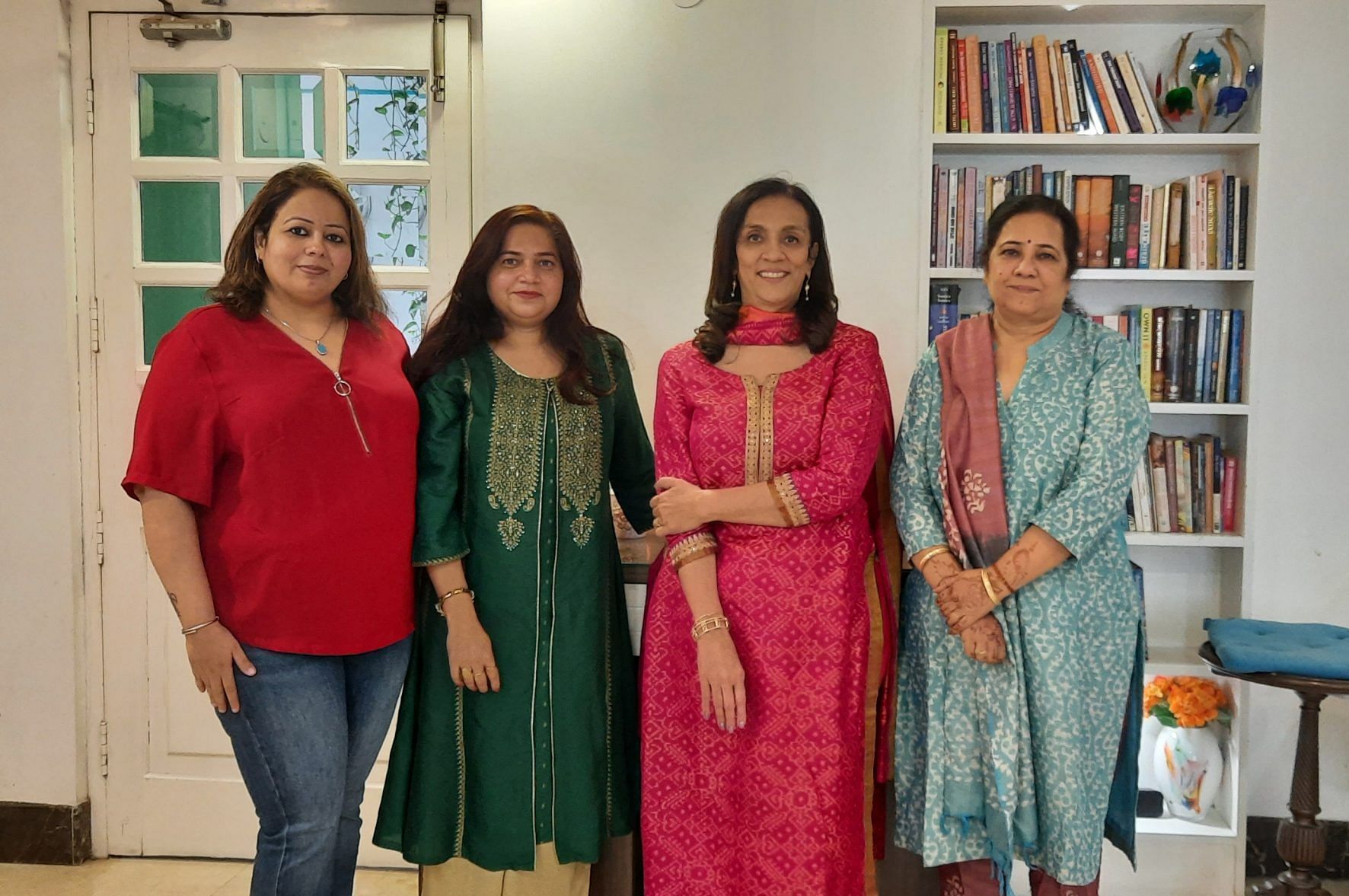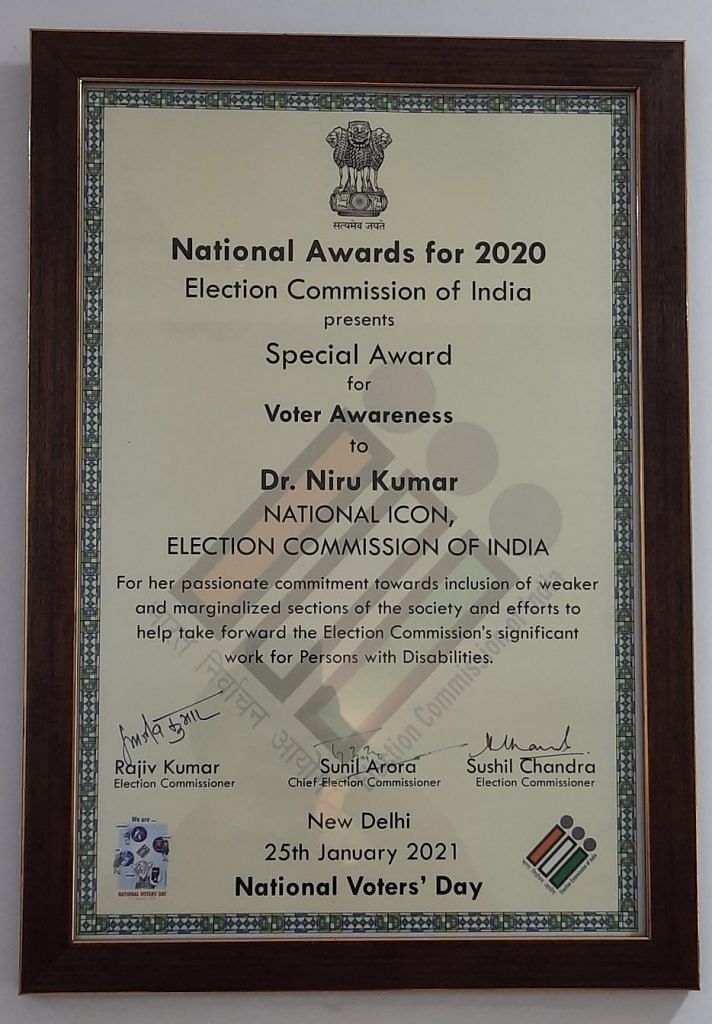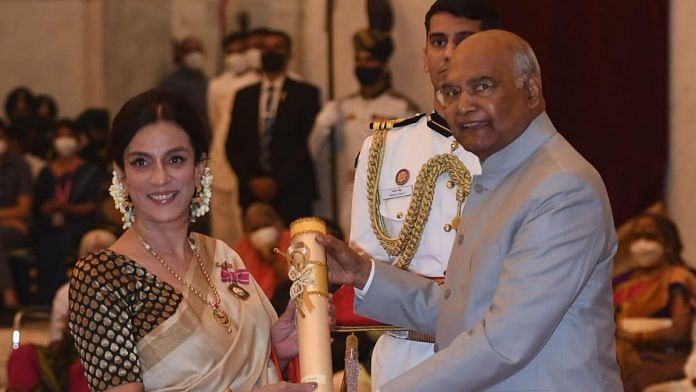Many years ago, while working as a doctor, Niru Kumar happened to read American relationship counsellor John Gray’s 1992 breakthrough book Men Are from Mars, Women Are from Venus. It meant a lot to her. This year, when her name echoed in the grand halls of Rashtrapati Bhavan, she walked up to President Ramnath Kovind in a red-bordered golden saari that matched the colour of the Padma Shri award she was given in recognition of a 30-year journey that resulted in her becoming India’s first ‘Mars-Venus coach’ — trained by none other than her inspiration, John Gray.
Social worker Dr. Niru Kumar, who is working for the empowerment of women for 3 decades, receives the Padma Shri from President Ram Nath Kovind at Rashtrapati Bhavan#PadmaAwards2021 #PeoplesPadma #PresidentKovind pic.twitter.com/JLtfkQOnJv
— PIB India (@PIB_India) November 9, 2021
President Kovind presents Padma Shri to Dr. Niru Kumar for Social Work. A medical doctor and gender diversity consultant, she is the founder of “Ask Insights”, a Diversity and Inclusion Consulting Organization. pic.twitter.com/h4aXtYq1RO
— President of India (@rashtrapatibhvn) November 9, 2021
Niru Kumar’s work in gender empowerment, diversity and inclusion might have started back in 2012, but she is no ordinary private sector consultant. After working as a senior officer for 25 years in the Central Government Health Scheme (CGHS), she took voluntary retirement to work in the field of diversity and inclusion. More than ‘gender sensitisation’, her method lays emphasis on ‘gender intelligence’ — a mindful way of mitigating differences. Her clientele includes the biggest corporations across the world — Walmart, Pepsico, Hindalco, SAP, Coca Cola, Vodafone, Cairns India, Vedanta Group, Tata Teleservices, and Barbara Annis & Associates.

Kumar, the founder of ‘Ask Insights’, a diversity and inclusion consulting organisation, is somewhat of a pioneer in raising awareness about the concept of diversity and inclusion among Indian companies. “At that time, about 15 years back, I was perhaps the first person who began the conversation of diversity at workplaces, particularly gender diversity, in India,” she tells ThePrint.
In 2020, as a polio survivor, she was also chosen as one of the national icons of the Election Commission of India (ECI), working on making polling accessible for people with different needs. In a recent interview with the Hindustan Times, Kumar said that her “voting experience was vastly different from what it is now. Back then, even a wheelchair could not go inside because there was no ramp.”
The Padma Shri award has made her believe that her life’s script has a deep purpose, and her voice will not go “unheard” anymore. Perhaps it was coping with difficulties as a child with polio that instilled a drive in her to create a positive change for people with different needs.
Also Read: ‘People’s Padma’ Awards shows the best of India, and not just the elite
Niru Kumar’s struggles of childhood
Niru Kumar’s parents were among the many who migrated from Pakistan during Partition. But both were working, and the fact that Kumar was diagnosed with polio in her early years when society had yet to identify accessibility as a necessity, did not help either. For her, it was a long and hard struggle to overcome by herself.
“It was almost like your life was doomed. These are the cards that are dealt and you have to make peace with them. You are not entitled to want too much out of life,” Kumar recalls. “That kind of struggle, along with the physical challenge of wearing calipers, was tough.”
Kumar says that her father had a progressive mindset and was a self-motivated person, which she learned from as a child. She says her orthopedician at Safdarjung Hospital, Dr Shankaran, also played an important role in helping her heal and manage her life.
She was only 6-years-old when she began understanding the need for fair treatment. “I just wanted people to respect each other. If one were to insult somebody because of who they were, whether it was on the road or in my own house, it would hurt me and I’d stand up for them. Of course, people did not appreciate it and asked what my problem was, why I was coming in the way, but it didn’t stop me,” she says.
Also Read: Meet Kanaka Raju, 80, Padma Shri awardee who has kept tribal folk dance Gussadi alive
Work on gender and diversity
While working as ‘Mars-Venus coach’, a relationship counselling and executive coaching based on the principles of John Gray’s book, Kumar realised that gender differences were a concern in the professional environment. During her work as a gender diversity and inclusion consultant, she witnessed the deep-rooted gender stereotypes that were keeping the women workforce behind in private organisations.
She told ThePrint about senior workers saying things like women have to “make a choice between having babies or coming to work” and that “roles in sales, industrial plants, manufacturing units or even technical roles were not supposed to be good for women because of the night duties and strenuous nature of these jobs.”
“Besides, the women also used to face comments on their appearance or bodies for roles such as sales. Young engineering graduates in manufacturing units would face comments like ‘tumne mechanical engineering kyun ki? Aur kuchh mila nahin kya?’ or even acche ghar ki ladkiyan ho, yahan par kyun aai ho?,” Kumar recalls.
She says that changing the culture in such places was significant because it was not only a good thing to do but also made strong business sense.
“It was my responsibility to convince them [the leaders] that they are here because of a professional choice and you cannot look at them as non-serious employees. I would say the culture changes, the language changes, and by the end of the day, I would see the transformation.” Kumar says she had to convince the senior leaders that if child-bearing and career development periods for women overlapped, it was not their responsibility alone. “It’s the collective responsibility of humanity, of organisations and of the government.”
Though India’s diversity hiring has gone up in recent years, female labour force participation is still extremely low at 24 per cent.
Kumar worked extensively with the private sector organisations conducting training sessions and workshops, formulating diversity and inclusion policies to make them sensitive towards the different needs of the women employees.
Also Read: A 1996 incident at a crematorium that changed Padma Shri awardee Jitender Singh Shunty’s life
National icon of the ECI
In June 2020, the Election Commission of India named Niru Kumar as one of the ‘National Icons’ and inducted her as a board member of the advisory committee on voter accessibility.
“Accessibility was a big agenda for the ECI in 2020 and I think they wanted representation of a person who has been able to overcome the challenges and comes from a place of credibility despite being different,” she tells ThePrint.
Kumar was awarded by the ECI for her work on voter accessibility and awareness in the 2020 Bihar elections. She laughs while recalling how she was at the venue receiving the award from the President for working on voter awareness with the ECI last year when the Padma award was also announced.

Having worked in the field of diversity and inclusion, Kumar does acknowledge that there is still a long way to go. She says that despite policy interventions, the representation of senior women in the corporate world is still a sad story across the world. “The reason is that mindsets are still not okay, biases still exist and policies are not enough,” she explains.
Talking about the policy initiatives in the private sector, she says that some organisations are progressive in their mindsets, while others just follow suit. “The government, however, already has strong policies. The two years of childcare leave is an example,” Kumar says.
Yet, she emphasises that it’s the combination of policy intervention and mindset change that makes the difference. “How do you change the mindset? First, you get the leaders to take ownership and become allies. Then they start communicating more until it becomes the agenda of the government and the corporate sector that each employee has to be sensitised right at the time of induction. Then the change happens,” Niru Kumar says.
(Edited by Srinjoy Dey)



